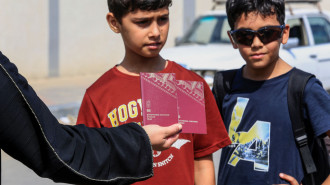Pro-Palestine voices blast lack of Western media coverage of ICJ Gaza genocide case against Israel
Pro-Palestine voices have taken to social media over the past few days to blast mainstream Western news outlets for failing to sufficiently cover South Africa's hearing in their case accusing Israel of committing genocide in Gaza.
South Africa filed its case against Israel at the International Court of Justice (ICJ) on 29 December, accusing Tel Aviv of committing genocide against the Palestinian people. The public hearings took place over two days, with South Africa making its case on Thursday, while Israel gave its defence on Friday.
Non-Western and non-mainstream news outlets extensively covered South Africa's hearing, a reflection of how momentous the case is.
However, there was a distinct lack of coverage of Thursday's hearing from the world's biggest news outlets including the BBC and CNN, which did not go unnoticed by viewers and journalists.
Palestinian writer and analyst Yara Hawari called the lack of Western media coverage of the first day "astounding".
Muhammed Shehada, communications chief for the Euro-Med Human Rights Monitor, which has been documenting some of the atrocities committed by Israeli forces in Gaza, said in a post on X: "I can NOT find the International Court of Justice hearing on CNN, BBC, Channel 4, Fox News, MSNBC, CNBC, CBS, NBC, I24, DW, Sky News, or any mainstream US/EU TV channel... What explains this unprecedented campaign of disinformation by omission?"
"There has been minimal to 0 coverage of South Africa’s case against Israel at the ICJ on the front pages of Canada’s major news outlets today," Canadian editor and writer Davide Mastracci said on X, attaching screenshots to his post of the front pages of the websites of outlets including CBC and The Globe and Mail.
Many mainstream Western outlets have been criticised throughout Israel's war on Gaza for showing bias towards Israel, be this through the spread of Israeli disinformation or the amount of time allotted to pro-Israel voices while Palestinian or pro-Palestine voices are shut down.
Some social media users predicted that outlets who had been noticeably quiet on the first day of the hearing would pick up their coverage the next day as Israel made their defence, which sure enough happened.
For example, the BBC aired the Israeli defence case after its quiet on the matter on Thursday. It instead chose to focus its live coverage on the Post Office scandal.
A BBC spokesperson said: “Both the South African and Israeli cases from the International Court of Justice featured prominently across BBC News on 11 and 12 January. Both cases were included in bulletins, live coverage and reported by BBC News Online, and both cases were live streamed in similar amounts on BBC iPlayer.
“The international feed of the BBC News channel featured more live streaming and analysis from the ICJ on Thursday 11 January than the UK feed, because the latter was taking live proceedings from the resumption of the Post Office inquiry – a story of huge public interest for UK audiences. The South African case was the lead story on both the international and UK feed during the evening of 11 January.
"Further to this, segments of the South African case were also played during coverage of the Israeli defence on Friday 12 January to give UK audiences as complete a picture as possible."
Some outlets with television channels appear to have relegated their coverage from TV screens to the online realm.
Sky News had been accused of not airing the South African hearing, though it had done so - albeit online.
The censorship of Palestinian voices comes despite harrowing scenes from Gaza, where at least 23,800 people - mostly women and children - have been killed by Israel in just three months.
This article has been updated to include a comment from the BBC.




 Follow the Middle East's top stories in English at The New Arab on Google News
Follow the Middle East's top stories in English at The New Arab on Google News


![The US vetoed a UN Security Council (UNSC) resolution demanding a ceasefire in Gaza [Getty]](/sites/default/files/styles/image_330x185/public/2185152251.jpeg?h=7ef8ac04&itok=RpLSj2pu)